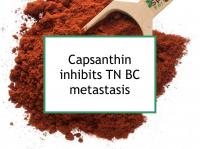Capsanthin is a red carotenoid found in most aromatic sweet red pepper (Capsicum annuum) varieties. Capsanthin is abundant in paprika, but is also found in red bell peppers, as well as in cayenne, chili, jalapeño, and serrano peppers. Now a new study has reported that capsanthin can inhibit key pathways involved in triple negative (ER-/PR-/HER2-) brain metastasis.
Capsanthin is not to be confused with capsaicin, which gives hot peppers their heat. Compared to hot peppers, paprika contains only a small amount of capsaicin. Capsanthin has been reported to reduce the viability of ER+/PR+ breast cancer cells and inhibit the proliferation of triple negative breast cancer cells. Capsanthin has also been demonstrated to reduce the number and growth of mammary tumors in a mouse model of triple negative breast cancer.
Latest research shows capsanthin inhibits metastasis
The study referenced above was designed to investigate the impact of capsanthin on the molecular mechanisms resulting in brain metastases in triple negative (TN) breast cancer. PD-L1, an immune checkpoint protein (which acts as a type of brake to keep the body's immune responses under control), has a central role in tumor immune evasion. PD-L1 inhibitors have been shown to have treatment effects in various cancer types, but their effectiveness in TN brain metastasis has not been established.
To conduct the study, the authors examined the impact of capsanthin on the tumor microenvironment of TN brain metastases. Capsanthin was found to inhibit the migration of TN brain metastatic cells. Capsanthin also significantly reduced the expression of EZH2 and N-linked glycosylated PD-L1 proteins, in addition to mRNA in both the primary and metastatic sites, as well as in mesenchymal stem cells (3A6). Elevated expression of EZH2, a protein that helps regulate gene expression, has been linked to poorer patient prognosis. In fact, there is a direct interaction between EZH2 and PD-L1 in TN brain metastases.
The authors also found that capsanthin suppressed the expression of epithelial-mesenchymal transition (EMT) markers in metastatic brain TN cells and mesenchymal stem cells. The authors conclude that capsanthin can favorably alter the tumor microenvironment (inhibiting key pathways involved in cancer progression), thereby offering potential treatment for patients with TN breast cancer brain metastases.
Please see our article on triple negative diet for more information.
